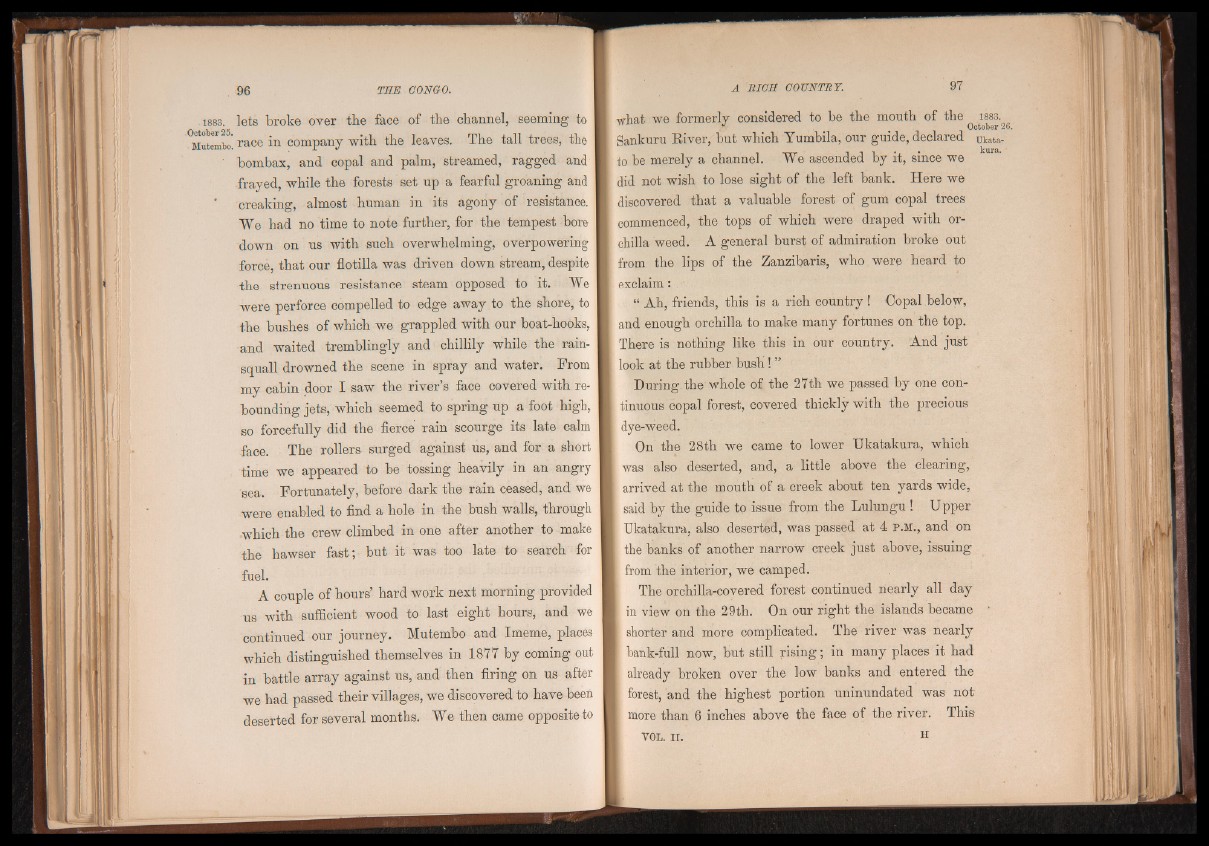
1883. lets broke over the face of the channel, seeming to
°Mutembo. race in company with the leaves. The tall trees, the
' bornbax, and copal and palm, streamed, ragged and
frayed, while the forests set np a fearful groaning and
creaking, almost human in its agony of resistance.
We had no time to note further, for the tempest bore
down on us with such overwhelming, overpowering
force, that our flotilla was driven down stream, despite
the strenuous resistance steam opposed to it. We
were perforce compelled to edge away to the shore, to
the bushes of which we grappled with our boat-hooks,
and waited tremblingly and chillily while the rain-
squall drowned the scene in spray and water. From
my cabin door I saw the river’s face covered with rebounding
jets, which seemed to spring up a foot high,
so forcefully did the fierce rain scourge its late calm
face. The rollers surged against us, and for a short
time we appeared to be tossing heavily in an angry
sea. Fortunately, before dark the rain ceased, and we
were enabled to find a hole in the bush walls, through
which the crew climbed in one after another to make
the hawser fastp but it was too late to seaich for
fuel.
A couple of hours’ hard work next morning provided
us with sufficient wood to last eight hours, and we
continued our journey. Mutembo and Imeme, places
which distinguished themselves in 1877 by coming out
in battle array against us, and then firing on us after
we had passed their villages, we discovered to have been
deserted for several months. We then came opposite to
w h a t w e fo rm e r ly c o n s id e re d to b e th e m o u th o f th e 1883. g _ October 26.
Sankuru River, but which Yumbila, our guide, declared ukata-
to be merely a channel. We ascended by it, since we
did not wish to lose sight of the left bank. Here we
discovered that a valuable forest of gum copal trees
commenced, the tops of which were draped with or-
chilla weed. A general burst of admiration broke out
from the lips of the Zanzibaris, who were heard to
exclaim:
1 Ah, friends, this is a rich country ! Copal below,
and enough orchilla to make many foi’tunes on the top.
There is nothing like this in our country. And just
look at the rubber bush ! ”
During the whole of the 27th we passed by one continuous
copal forest, covered thickly with the precious
dye-weed.
On the 28th we came to lower Ukatakura, which
was also deserted, and, a little above the clearing,
arrived at the mouth of a creek about ten yards wide,
said by the guide to issue from the Lulungu ! Upper
Ukatakura, also deserted, was passed at 4 p .m ., and on
the banks of another narrow creek just above, issuing
from the interior, we camped.
The orchilla-covered forest continued nearly all day
in view on the 29th. On our right the islands became •
shorter and more complicated. The river was nearly
hank-full now, but still rising; in many places it had
already broken over the low banks and entered the
forest, and the highest portion uninundated was not
more than 6 inches above the face of the river. This